Subjective Well-Being and Mathematics Achievement. What is the Role of Gender, Instructional Clarity and Parental Involvement?

The aim of the present study was to explore the relationship between satisfaction with life and mathematics achievement among a nationally representative sample of Grade 9 learners in South Africa. Using the Trends in Mathematics and Science Study (TIMSS 2019) based on a sample of 20 829 learners (females = 11 067 and males = 9 719), and employing ...
Published in: 2022
Authors: Angelina Wilson Fadiji
Keywords: Gender / instructional clarity / Mathematics Achievement in South Africa / Parental involvement / Well-being
Leaving boys behind: The impact of gendered repetition patterns on South Africa’s TIMSS mathematics results
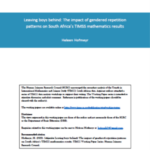
This paper analyses gender differences in South Africa’s TIMSS Grade 9 mathematics achievement, with particular emphasis on the role of gendered grade repetition and dropout patterns in contributing to an apparent pro-girl gap in mathematics achievement. I make use of Oaxaca-Blinder decomposition analysis to decompose the observed pro-girl gap in ...
Published in: 2022
Authors: Heleen Hofmeyr
Keywords: Gender / Mathematics Achievement in South Africa / TIMSS 2019
Investigating grade 9 mathematics achievement in the Western Cape and Gauteng: An analysis of TIMSS 2019
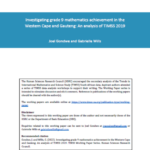
In the 2019 Trends in International Mathematics and Science Study (TIMSS), two of nine South African provincial education departments sought to increase the precision of their performance estimates through the participation of a larger school sample. This enables the comparison of students’ mathematics performance in these two provinces against e ...
Published in: 2022
Authors: Joel Gondwe / Gabrielle WIlls
Keywords: Gauteng Grade 9 results / TIMSS 2019 / TIMSS in South Africa / Western Cape Grade 9 Results
Illuminating shadow education in South Africa: Mapping participation in and demand for extra lessons
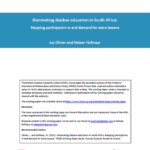
The term ‘shadow education’ is widely used in the international literature to refer to after-school tutoring programmes (Zhang and Bray, 2020: 335). This paper investigates the prevalence of after school programmes in South Africa, focusing on extra maths lessons not provided by the school. Since 1995, the TIMSS results have consistently reveal ...
Published in: 2022
Authors: Joy Olivier / Heleen Hofmeyr
Keywords: After school programmes / Mathematics extra lessons / TIMSS 2019
Gender, and attitudes towards mathematics and student achievement
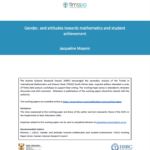
That girls continue to be underrepresented in science, technology, engineering, and mathematics (STEM), is of concern both for the future of work and for the reduction of labour market inequalities. This study employs distributional analysis to investigate the relationship between attitudes towards mathematics and achievement for grade 9 girls and ...
Published in: 2022
Authors: Jacqueline Mosomi
Keywords: Attitudes towards Mathematics / Gender gap / TIMSS 2019
Do instructional leadership practices drive educational improvement gap in South Africa? Evidence from Oaxaca-Blinder decomposition analysis of TIMSS 2015 and 2019 study
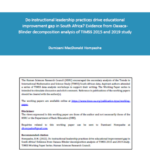
Quality school leadership and management is an important determinant of quality teaching and learning, especially in low-resourced schools. According to South Africa’s national development plan (NDP), principals should provide both administrative and curriculum leadership at schools. This paper investigates the improvement between 2015 and 2019 G ...
Published in: 2022
Authors: Dumisani Hompashe
Keywords: instructional leadership / TIMSS 2015 / TIMSS 2019
